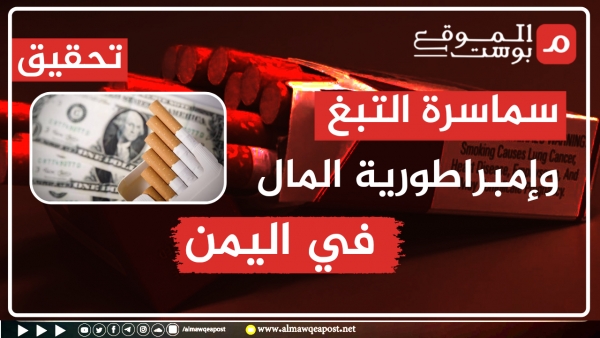
[ [The investigation of smuggled cigarettes revealed many facts and preferential information- Al-Mawqea Post Website] ]
The cigarette market in Yemen is witnessing a wide increase in smuggled items, which have flowed dramatically in recent years, due to the security chaos, causing financial losses to the Yemeni economy, which is deprived of tax revenues in the billions of riyals every year, as a result of smuggling operations.
In this investigative report, Al-Mawqea Post traces illegal cigarette smuggling operations from several countries, most notably from UAE to Yemen, the networks behind them, and the accomplices of these networks in areas under the control of the legitimate government. Maritime and land smuggling routes, the losses incurred by the Yemeni economy as a result of smuggling operations, the beneficiaries of the flourishing trade in smuggled cigarettes in Yemen, and the serious health damages to Yemenis caused by smoking smuggled cigarettes.
We note here that we have put abbreviated headings as symbols for the names of the personalities who spoke in this investigation upon their request, and out of concern for their safety, due to the sensitivity of the information they disclosed.
Massive Spread
(MA), a senior source in the Tax Authority in Aden, confirms that cigarette smuggling operations to Yemen have increased significantly during the recent period, pointing to an increase in the percentage of smuggled cigarettes in Yemen during the war period to 200% compared to the pre-war years.
(M.Y.), a senior official in Kamaran Company, stated that the massive influx of smuggled cigarettes into Yemen caused a decrease in the proportion of local production of cigarettes produced by the three Yemeni tobacco companies, "Kamran" (governmental), "United Industries" (private), and the National Cigarette and Matches Company Limited- Aden (governmental). These companies were generating huge taxes. They were considered to be the second largest resource for the Yemeni economy after oil, during the pre-war period, before production recently declined to insignificant levels, the production of the National Cigarette Company "Kamran" alone declined by 90% in just five years, according to official statistics of the company, that Al-Mawqea Post obtained a copy of.
The company's sales taxes that were supplied to the state treasury were reduced from 64 billion and 890 million riyals during the year 2013, to 8 billion and 113 million Yemeni riyals only during the year 2018, according to the same statistics.
On the other hand, the quantities of smuggled cigarettes in the country have doubled in an unprecedented manner during the last seven years, due to the security deterioration that Yemen is witnessing as a result of the ongoing war, as only about two million cartons of smuggled cigarettes infiltrated the country during the year 2021.
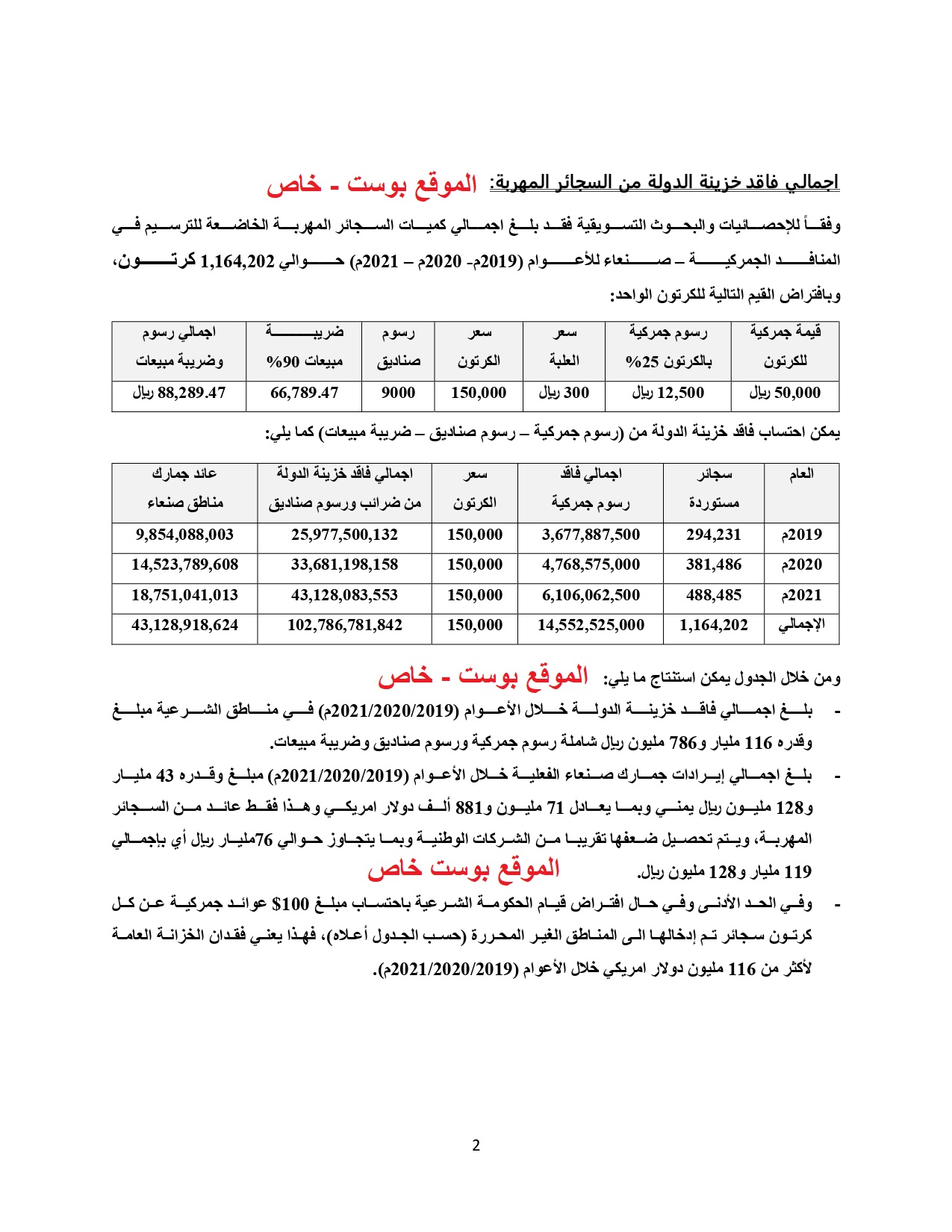
Types of Smuggled Cigarettes
There are more than 160 types of smuggled cigarettes in the Yemeni market, most of which were found to come from the UAE. The author of the investigation exclusively monitored 16 varieties of which are found in a number of Yemeni governorates, namely, "Modern", "Royal Rushman", "Bonn", "Manchester", "Milan", "Rasimane", "Fetcher", "Gold Bull". ,
“Pulse”, “Aurais”, “Queen”, “Mikado”, “Milbo”, “MG”, “Super 7”, and “Mocha”, all of which were produced in tobacco factories located in the Jabal Ali Free Zone- UAE. This free zone is considered to be the third in the world after China and Taiwan in the manufacturing of counterfeit products, including cigarettes, according to data from the Economic Cooperation Organization.
Among the most prominent of these factories and companies exporting illegal cigarettes that arriving Yemen are "Global Tobacco", "Kolbahar Tobacco International", "Orchid Tobacco Industries Limited", "European Tobacco", "Intercontinac Tobacco", "Dubin Agencies", "Yanver Sal Tobacco Yemen”, “Union Factories for the Production of Tobacco and Cigarettes”, “Kani International American Tobacco Company”, and “Crown Agency Limited Tobacco”.
Types Multiply
Ahmed Qasim, a tobacco trader in Taiz Governorate (southwestern Yemen), complained about the multiplication of new types of smuggled cigarettes in the local market. He confirmed that it is very popular with Yemeni smokers, because of its cheap price compared to local types.
The average price of a locally manufactured packet of cigarettes is about 1,000 Yemeni riyals (two dollars in the north and one dollar in the south), while its smuggled counterpart is sold for an average of 400 Yemeni riyals, which is a cheap price compared to the prices of local cigarettes. This prompts many smokers to prefer cheap smuggled cigarettes compared to their local counterparts, which are too expensive for Yemenis, who suffers from poverty and bad conditions resulted from the current crisis.
Maritime Smuggling Route
The fake cigarettes are shipped from the country of origin in UAE, and are smuggled by commercial ships via the international road in the Red Sea, the Bab al-Mandab Strait all the way to Djibouti, and then to the Yemeni sea ports.
The shipments of smuggled cigarettes arrive at separate lots to the port of Djibouti, which is the first point of arrival, due to its proximity to the Yemeni coast, as well as that commercial ships are not subject to inspection, except in the case of prior reports. This facilitates the passage of smuggled cigarette shipments to Yemen, according to (F.S.N), a source in the Yemeni Tax Authority, who spoke to Al-Mawqea Post.
The goods of "smuggled cigarettes" stay for some time in the port of Djibouti, and then smuggle through the Red and Arab seas, the Bab al-Mandab Strait, to the Yemeni ports in a number of governorates, which are considered to be the second access points for cigarettes before they are spread in the markets. Among the most prominent of these ports are: the port of "Mukalla" and "Al-Shihr" in Hadhramaut, the "Shahin" road port and the "Nishon" port in Al-Mahra, the "Al-Luhia", "Al-Khoukha" and "Yahktel" ports in Hodeidah, the ports of "Mocha" "Thobab" and "wajjah" in Taiz, and "Ras Al-Ara" port in Lahj.
The source at the Yemeni Tax Authority stated that all Yemeni coasts are now open to smuggling operations, due to the chaos of the war. He stressed that the most dangerous smuggling operations reach the western coast, which extends from "Al Khokha" in Hodeidah, to "Ras Al-Ara" in Lahj, which is a favorite to cigarette smugglers due to being close to the regions of the African Horn, and that it contains open areas that facilitate smuggling operations to Yemen.
As soon as the sea shipments carrying cigarettes arrive at the named points in the Yemeni ports, they are discharged to small transport ships that carry the goods in turn to closer areas, to be then unloaded into small boats to deliver quantities to the warehouses owned by smugglers, close to the beaches, and are dedicated to storing smuggled cigarettes. There, the goods remain for a few days before they start smuggling them by land on transport trucks, to be delivered to a number of Yemeni governorates.
Land Smuggling Route
The smuggling operations start from the western and southern coasts through three wild "earthy" routes. The route of the first flight starts from “Wahija” outlet in Mocha, passing through the areas of “Mawza’a”, “Aro’a”, “Al-Dush” and then “Al-Wazi’a” (south of Taiz) to the “Tur Al-Baha” area in Lahj, and finally spreading to the markets of the southern governorates. This road is under the control of the Forces led by Tariq Saleh, a member of the Presidential Council.
The second operation starts from Al-Saqia area in Lahj, passing through the "Ras Al-Ara" area, then "Ras Omran", reaching the markets of the southern governorates as well. This road is under the supervision of both "Tariq Saleh forces" and the security belt forces of the "STC".
As for the third operation, it starts from "Ras Al-Ara" area in Lahj, passing through "Tur Al-Baha", then "Al-Sabiha areas", reaching the city of "Al-Turbah" (south of Taiz). After that, the goods pass through the directorate of "Samea", to "Khadir in Taiz", then "Al-Hawban" and spread in the markets of the northern governorates. This road is under the control of the "STC", "Government Forces", and the "Houthi group", respectively.
Fast Paths
In addition to earthy roads, there are three "Asphalt" roads used by cigarette smugglers to deliver goods to Yemeni markets. The trip begins on the first road from the port of Mocha, then "Wahjah", "Jabal Al-Nar", passing through "Al-Wazi'ia" and "Jabal Habashi", and spreading to the markets of Taiz city. This road is under the control of both the Tareq forces and the the Government forces.
The second trip follows a path opposite to the first, as it starts from "Wahja" area, then "Al-Mocha", then "Al-Zohari" and "Salem neighbourhood", reaching to the city of Hodeidah in the west, then heading towards Sana'a, spreading to the markets of the northern governorates. This road is under the control of both the "Houthi group" and the forces managed by Tariq Saleh, a member of the Presidential Council.
As for the third trip, it starts on an (Isalfati-earthy) road from "Ras Al-Ara" area in Lahj, then "Al-Mocha", then "Al-Kadha", "Meerab" (west of Taiz), to "Sharab Al-Rouna" and then proceeding towards "Al-Dhakra Joint", west of the city, heading north towards the markets of "Ibb", "Dhamar" and "Sana'a". This road is under the supervision of the forces of STC, government forces, and the Houthi group.
Broad Collusion
Cigarette smuggling trips take place from the areas of arrival to a number of Yemeni governorates, through smuggling routes specific to each governorate, and under the knowledge and supervision of all military factions affiliated with both the government and the Houthis, along with other local groups.
Saeed Al-Makhawi, one of the truck drivers working in cigarettes smuggling from "Ras Al-Ara" area in Lahj to Taiz city, confirms that all shipments that arrive in the city pass in full view of all the security points scattered along the road linking the two governorates, which extends for more than 80 km.
In an interview with Al-Mawqea Post, Saeed said that those in charge of the security points (checkpoints) on this road, who are affiliated with three military forces (Tareq Forces, STC, and Government Army), do not require smugglers to present any official papers, and rather allow trucks to pass for sums of money. They receive varying amounts, sometimes up to 50 thousand riyals per truck.
According to him, all security points receive amounts in return for allowing the passage of cigarette smuggling trucks intended to reach Taiz governorate, except "Alhanger" point stationed at the southern entrance to the city, which imposes a fee of about 60,000 riyals on each truck, part of which goes to the city improvement fund.
Military Entities Involvement
Cigarettes are smuggled from ports under the control of the Yemeni government in Lahj, Aden, and Taiz to the areas controlled by the Houthis. There are military authorities and leaders affiliated with the government that allow the passage of smuggled cigarettes in return of sums of money they receive. Consequently, these entities are directly involved in cigarette smuggling, which loses the Yemeni economy $500 million annually, according to economic sources.
Numerous sources confirmed to this investigative report writer the involvement of military entities affiliated with the government in the cigarette smuggling operations. A government official in Al-Waziyah district of Taiz governorate confirmed to Al-Mawqea Post that leaders in the forces led by Tariq Saleh supervise the smuggling operations that pass through the district, and secure the way for smugglers in return of money received and supplied for the benefit of these leaders.
The government source, preferred not to be named for security reasons, said that many trucks carrying huge amounts of smuggled cigarettes that pass through Al-Wazia, own official statements granted by the Arab coalition forces, which makes the government control agencies unable to act on that.
Corruption and Lack of Supervision
The government's supervision role is absent in the maritime areas from which cigarettes are smuggled, and it is at best paralyzed or unable to act. This is due to the multiple loyalties of the military and security authorities in the areas affiliated with the government through which the smuggled cigarettes pass.
The matter does not only stop at the absence of the oversight role of government agencies, but extends to the level of complicity and supervising smuggling operations.
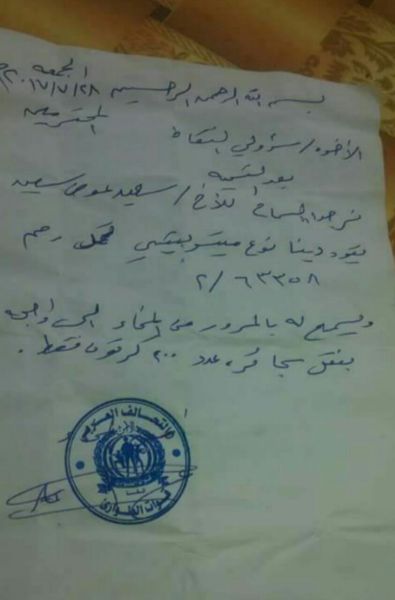
[A document issued by the Arab coalition allowing the passage of a truck loaded with cigarettes]
Muhammad Ataa (nickname), an employee at the port of Mocha, confirms the involvement of military and security leaders affiliated with the Yemeni government in the crime of facilitating the transit of smuggled cigarette shipments into the Yemeni interior, for money amounts received from smuggling networks in return.
Multiple sources who spoke to the author of this investigation stated that these leaders, who practice this type of corruption by abandoning their legal responsibilities in combating smuggling operations, reap huge sums of money as bribes in return for facilitating the passage of shipments of smuggled goods. This explicitly violates Law 26 of the Yemeni constitution, which is concerned with combating smoking and dealing with its harmful effects. Article 20 of it stipulates the confiscation of any amount of cigarettes that enter the country illegally, as well as fining both the smuggler and the local seller according to the eighth of the quantity in his possession.
The finger of accusation specifically in the issue of complicity with these smuggling operations is directed at leaders in the military forces that manage the areas through which smuggled cigarettes infiltrate, located in the western and southern coasts of Yemen. These leaders are under the control of "Tariq Saleh's forces" and the STC forces that control the southern coast, extends from Lahj to Shabwa.
Disclaimer from Responsibility
The author of the investigation contacted the official spokesman for the Joint Forces in the West Coast, “Waddah al-Dubaish” to ascertain the fact that there are military leaders affiliated with the government involved in cigarette smuggling operations, who admitted the same without mentioning their names. He also denied the existence of any form of agreement between these forces and the cigarette smuggling networks.
Al-Dubaish said in an interview with Al-Mawqea Post that the phenomenon of smuggling cigarettes to Yemen is not new, but its activity has doubled in recent years due to the security chaos resulting from the war crisis.
He pointed out that the smuggling operations are managed in an organized manner, supported by several influential personalities, military leaders and government officials, whose names he did not mention. However, he said that they are prominent officials, stressing that these personalities earn huge amounts of money estimated at millions of dollars, which enabled them to build increasing influence and power, supporting their interests related to the activities of smuggling goods to Yemen.
The military official confirmed the existence of corrupt military and security leaders who informally provide facilities for smugglers to pass goods in return of bribes money they receive periodically from influential people who take advantage of the absence and weakness of the state to intensify smuggling activities. He attributed the reasons for this to the personal ambitions of these leaders, and to the fact that they are new members of the security and military apparatus.
Al-Dubaish attributes this corruption to the state of war and the disintegration of the Yemeni anti-smuggling forces, in addition to the youth of the employees and leaders of the institutions that are supposed to be affiliated with the Yemeni government.
He also talked about the establishment of the "Joint Forces" to which he belongs, in cooperation with formations of the STC forces, and the security forces of Lahj Governorate, in establishing a seaport in "Ras Al-Ara" area in Lahj, which was made with the aim of confronting tax evasion operations and discovering the most dangerous smuggling operations. However, he emphasized that the money collected from this port is not transferred to the state treasury, and rather goes into the pockets of influential leaders belonging to those forces.
In Al-Mahra Governorate, multiple networks operate in smuggling cigarettes through areas close to the port of Nishtun, and these areas are controlled by government forces. According to Muhammad Jamal (nickname), a senior official at Al-Mahra Customs Authority, the smuggling networks transport these goods from large ships to small boats, and then transferred to warehouses in the governorate. After that, it is distributed to vehicles to be transported to the nearby governorates via multiple roads, in full view of everyone. There are security points that impose fees on these goods for the benefit of the Improvement and Cleanliness Fund.
Houthi Involvement
There are many parties behind the smuggling and trafficking of cigarettes. There are influential people who manage- directly or indirectly- the networks that are active in smuggling cigarettes from foreign countries to Yemen. The author of this investigation was able to reach the tip of a thread that leads to the names of some lords of trafficking in smuggled cigarettes, who are almost merchants and businessmen affiliated with the Houthi group, and are considered the most prominent of those behind this illegal commercial activity.
The author of this investigation also obtained information from a senior source in the "Kamran Company" confirming that the Houthi group had established companies to import smuggled cigarettes and trade in them, as part of the group's commercial activity to finance its own economy.
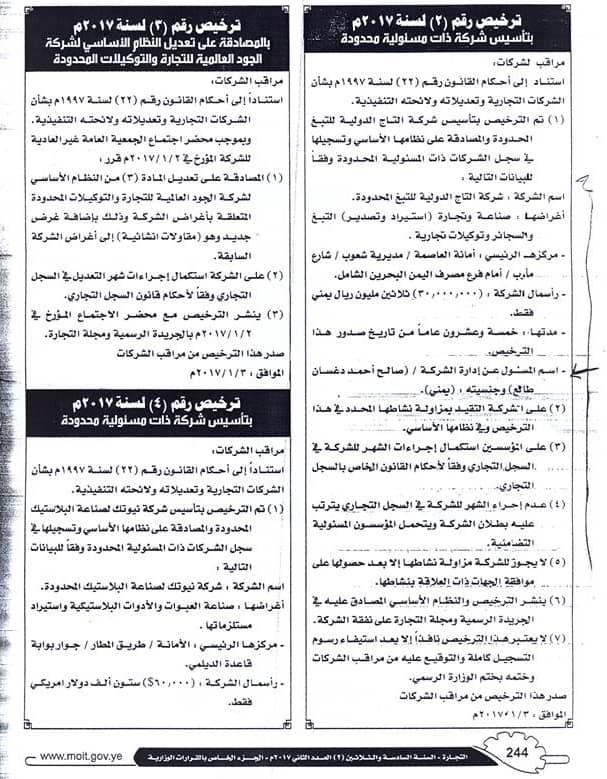
[Establishing a cigarette company in Sana'a- advertisement in a government newspaper]
The source (Q.S.), who preferred not to be named for security reasons, says that in 2017, the Houthi group held a meeting with the directors of the National Tobacco and Match Companies, headed by Mahdi Al-Mashat, who was then head of the Houthi Economic Committee, asking them to produce counterfeit cigarettes for three brokers of illegal business who work for the group. These brokers are: Saleh Daghsan, Moaz Al-Talh, and Muhammad Saleh Al-Hubaishi, but he said that this request was rejected by the directors of the tobacco companies.
This prompted the group to act differently, as it authorized the loyal businessman loyal, Saleh Daghsan, to establish a commercial company for the production of counterfeit cigarettes, called "Al-Taj International Tobacco Company Limited", which- according to the source- established a factory for the group in "Jebel Ali" free zone- UAE, and produces the brand of cigarettes known in Yemen as "Shamlan" of various types. The company smuggles it from "Jebel Ali" to Yemen and other countries, including Saudi Arabia, Iraq, Egypt, and Oman.
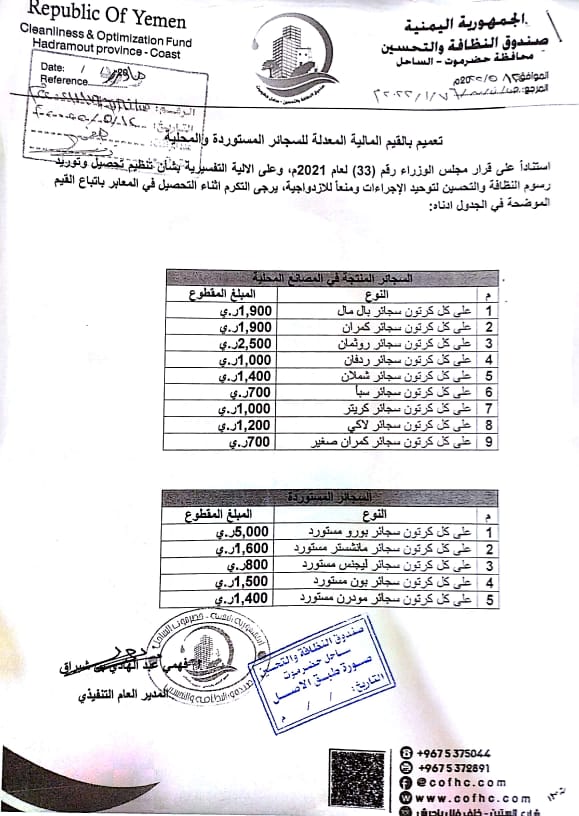
[A document for the Cleaning and Improvement Fund in Hadramout to impose taxes]
Smuggling Networks
The group is active in trafficking with smuggled cigarettes, as a number of merchants working for it indirectly run the networks that smuggle these cigarettes from "Jebel Ali" in UAE to the Yemeni markets.
Saeed Haidara and Nasser Qabi' are among the most prominent cigarette smugglers to Yemen. Under their management, there are small smuggling networks operating, which are authorized to store quantities of cigarettes, and manage land, sea transport activities, both of which serve higher-level brokers who in turn work in the interest of the Houthis.
The networks authorized to download and store smuggled cigarettes that come to destinations in a number of areas in Mocha, Lahj and Al-Hodeidah are managed by Aref Muza’ and Muhammad Hassan Makki, while one network consists of 50 individuals.
As for the land transport networks authorized to smuggle cigarettes to the Yemeni governorates, they are managed by three brokers, namely: Ali Al-Baydani, Muhammad Al-Radai, and Ali Al-Hashash. They own a fleet of transport trucks entrusted with smuggling goods from coastal access points to a number of Yemeni governorates.
A Sector Serves the Houthis and Exhausts the Government
"Smuggled cigarettes" represent as a global industrial and commercial activity that is not subject to legal supervision and international quality control as well. It is one of the most important commercial sectors that finance criminal gangs and terrorist organizations, as is the case in Yemen. The Houthi group relies in part of its self-financing on the trade in smuggled cigarettes.
(Q.S.), the official source in "Kamran" company confirms this information, saying that leaders in the Houthi group- preferred not to be named -completely control the trade section of "smuggled cigarettes" in Yemen, which is one of the largest sources of financial income for the group.
The smuggled cigarettes are supplied to outlets, most of which are under the control of the recognized government, but the latter does not benefit from it. Cigarette goods pass through government areas illegally, and are not subject to customs duties, except customs collection points in the "Ras al-Ara" port in Lahj governorate, which collect financial resources that do not find their way into the state treasury, and rather go into the pockets of influential people.
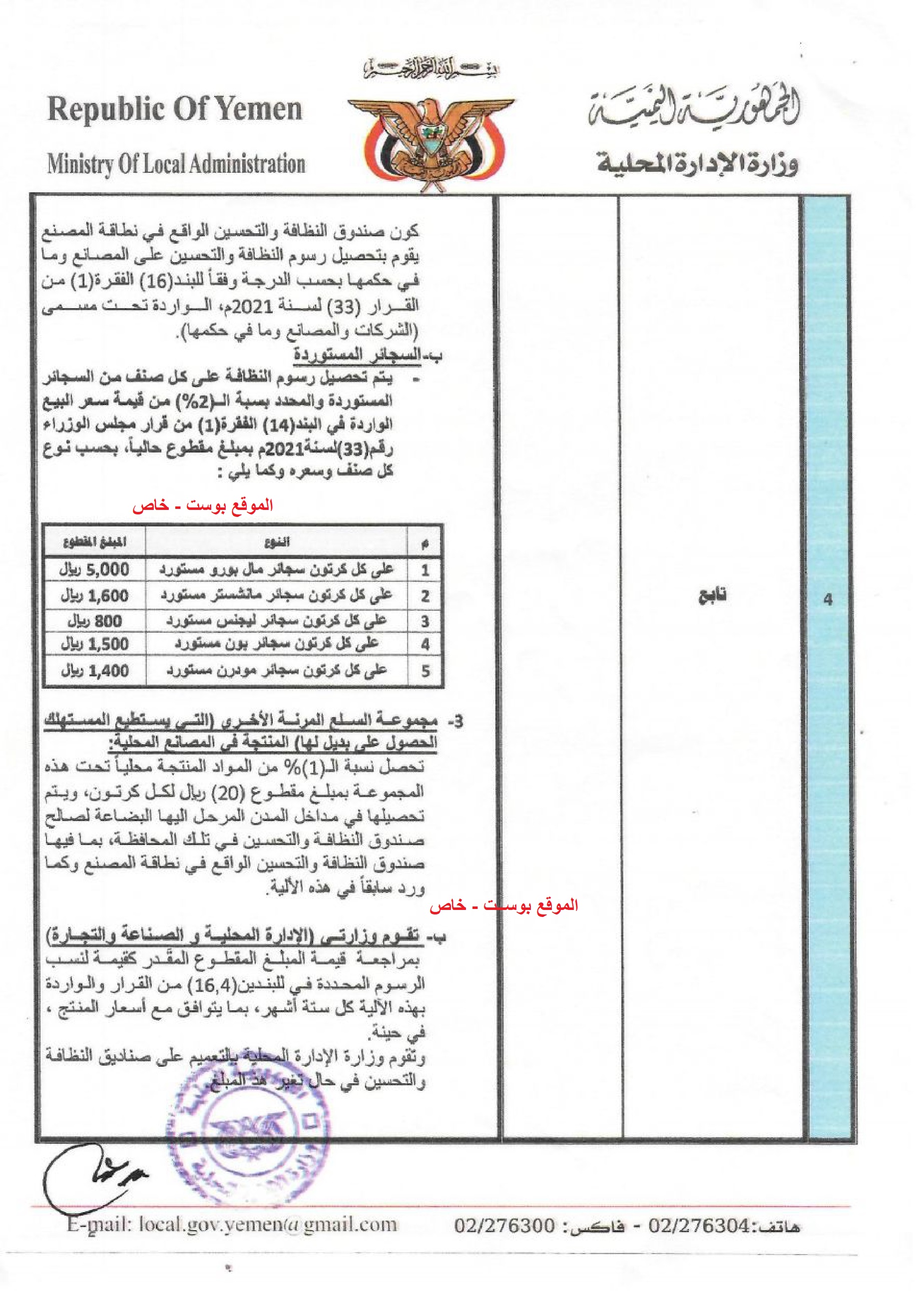
[A document for the Cleaning Fund in Aden to collect fees from cigarettes]
On the other hand, smuggled cigarettes are subject to customs conditions upon their arrival in Houthi-controlled areas. Despite being a commercial activity controlled by the group itself, the latter imposes customs duties on smuggled cigarettes at the entrances to the cities it controls. However, these fees go to the interest of the group's leaders, thus multiplying their profits to high levels.
A document obtained by the author of this investigation confirms that the total percentage of what the Houthi group obtained from the financial revenues it received from smuggled cigarette customs amounted to 43 billion and 128 million riyals during the three years 2019, 2020, and 2021.
Economic Losses
The financial treasury of the recognized government incurs huge losses amounting to 500 million dollars every year, due to cigarette smuggling operations. This is because locally produced tobacco taxes, which have recently declined due to the influx of smuggled cigarettes, were the second largest resource for the Yemeni economy after oil, according to multiple economic reports. Therefore, Yemen loses billions of riyals every year, amounts that it was supposed to earn as tax revenues from legally imported cigarettes, and from local production that was thriving before the smuggled species infiltrated and took over the Yemeni markets.
The Yemeni economy lost about 111 billion riyals during the past six years, due to the decrease in tax revenues from legally manufactured cigarettes, after the volume of its production decreased from 90% during the pre-war period to only 43% during the last seven years, according to a recent report issued by the Yemeni Tobacco and Matches Company.
The report- of which Al-Mawqea Post obtained a copy- estimated the rate of increase in illegal "smuggled" cigarettes spread in Yemen during the last seven years at more than double what it was during the pre-war years. The percentage of smuggled cigarettes increased from 40% to more than 80%, compared to local production, during the pre- and post-war periods. There are more than 160 types of smuggled cigarettes currently invading the Yemeni market.
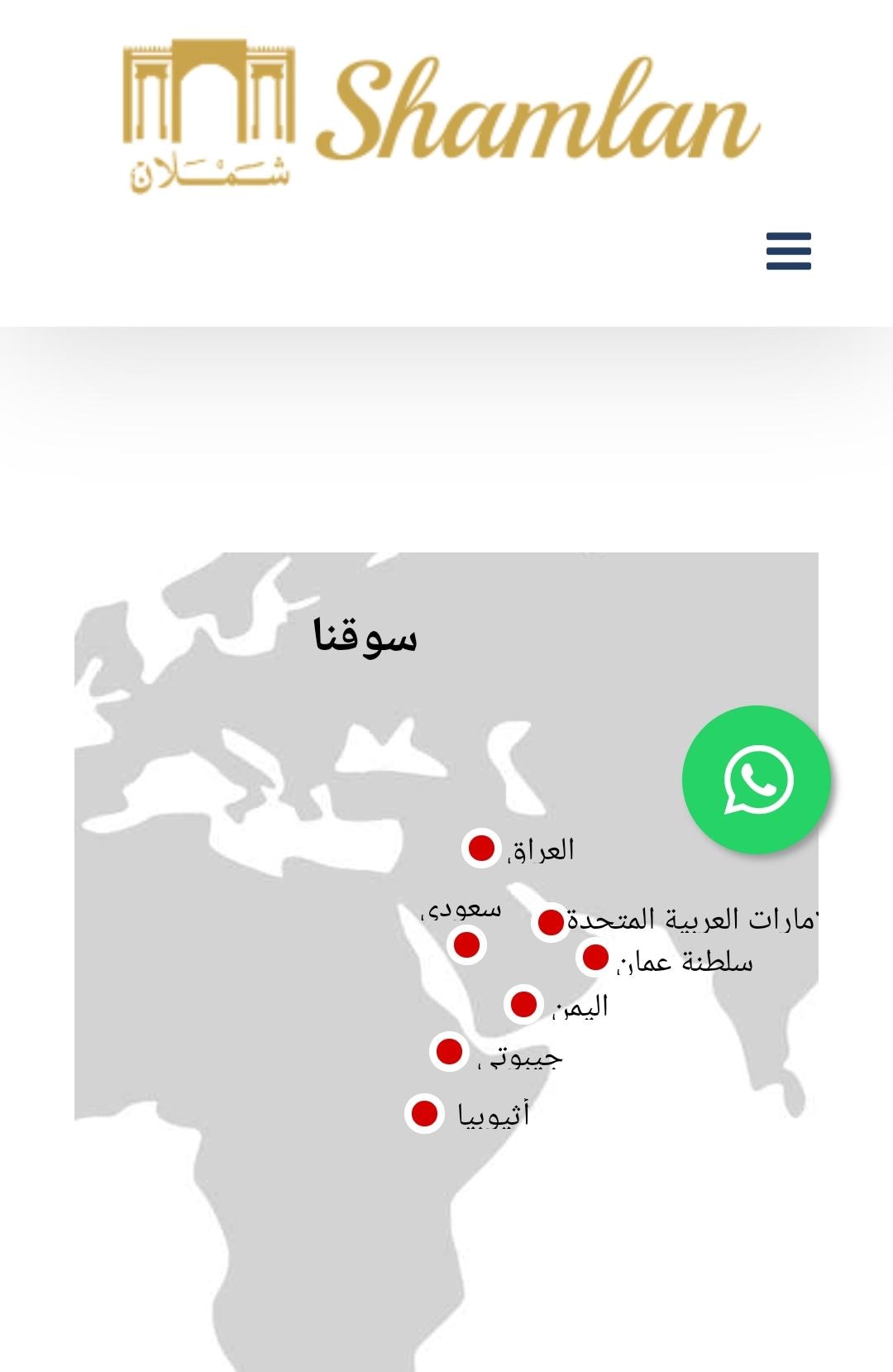
[The spread of Shamlan Company for producing Cigarettes]
Ahmed Sultan, an employee of the Tax Authority in Al-Mahra Governorate (eastern Yemen), confirmed to Al-Mawqea Post that the Yemeni government’s losses as a result of the cigarette smuggling operation amounted to $500 million (279 billion Yemeni riyals) during only one year. This is a major indicator of the loss suffered by the Yemeni economy, equal to 10% of the total percentage of the country's annual financial budget.
The economic damage caused by trafficking in "smuggled cigarettes" extends to government service institutions specialized in matters such as welfare, development and culture. These institutions relied for their financing, in part or in whole, on the revenues obtained from cigarette taxes, based on legal provisions enshrined in the Yemeni constitution.
These institutions are lacking, namely: “Fund for the Care and Rehabilitation of the Handicapped”, which used to receive 500 riyals from each average box of cigarettes, based on a legal text to that effect, and the “Skills Development Fund”, “Youth Welfare Fund”, and the “Heritage and Culture Fund”, who all depended part of their operating expenses on tax revenues from cigarettes; today, they lack the necessary operating expenses to perform their service tasks normally.

[Shamlan company address in UAE]
Double Health Damage
Smuggled cigarettes cause health damage up to double, compared to their counterparts of cigarettes manufactured according to international quality standards, whose trade is subject to legal control, due to the fact that the former are not subject to any quality standards, and many of them come from unknown sources.
Smoking is one of the three leading causes of death in Yemen, after gunshots and traffic accidents, according to WHO data. Considering the alarming prevalence of smuggled cigarettes in the country, this is almost understandable.
A recent report issued by the Yemeni Ministry of Health stated that all smuggled cigarettes are unfit for consumption due to the decomposition of the chemicals contained in them as a result of exposure to sunlight, moisture and poor storage during smuggling operations.
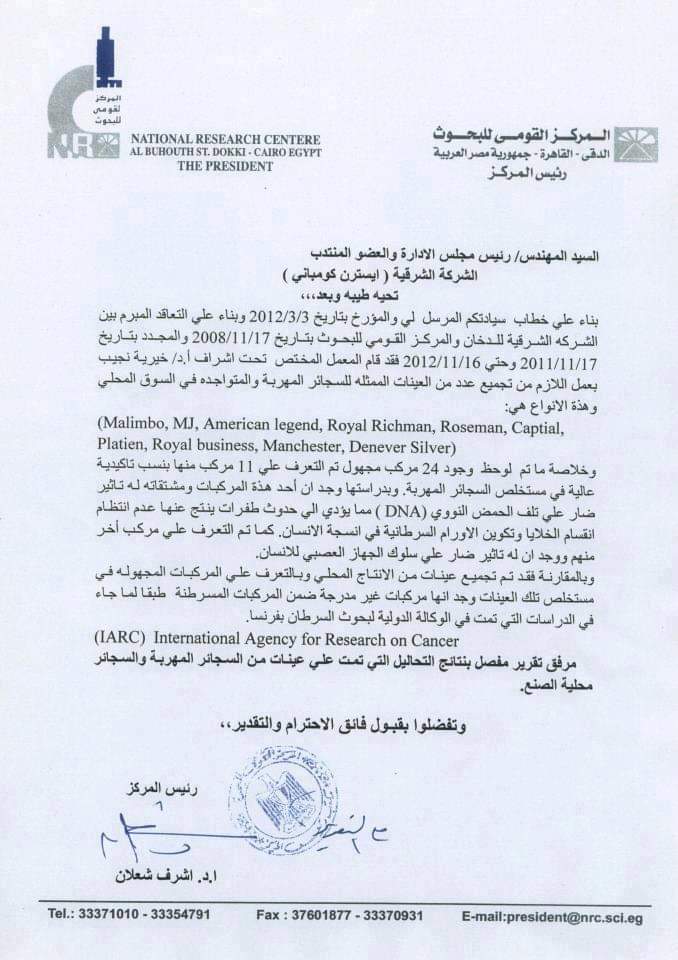
[A document in which the Egyptian National Center warns of the danger of smuggled cigarettes]
In an interview with Al-Mawqea Post, a specialist in public health, Muhammad Al-Mulaiki, warns of the danger of consuming smuggled cigarettes. He said that its satisfactory effects appear quickly compared to other cigarettes manufactured according to quality standards. Because, they contain lower-quality tobacco, contain harmful contents, most notably: sawdust, plastic materials, and high levels of toxic chemicals, including: cadmium, lead, nicotine, tar and carbon monoxide, which amounts to about 12.5 mg per a cigarette.
Data from the Yemeni General Administration for Anti-Smoking confirm that smuggled cigarettes contain 4,000 types of harmful chemicals, most notably: “benzene,” “methanol,” “ammonia,” “cyanides,” “acetone,” “arsenic,” “lead”, “radmium”, “cadmium”, “formaldehyde”, “hydrate”, “carbon”, and “polonium”, most of which are toxic and cause multiple types of cancer, lung diseases, and respiratory tracts.
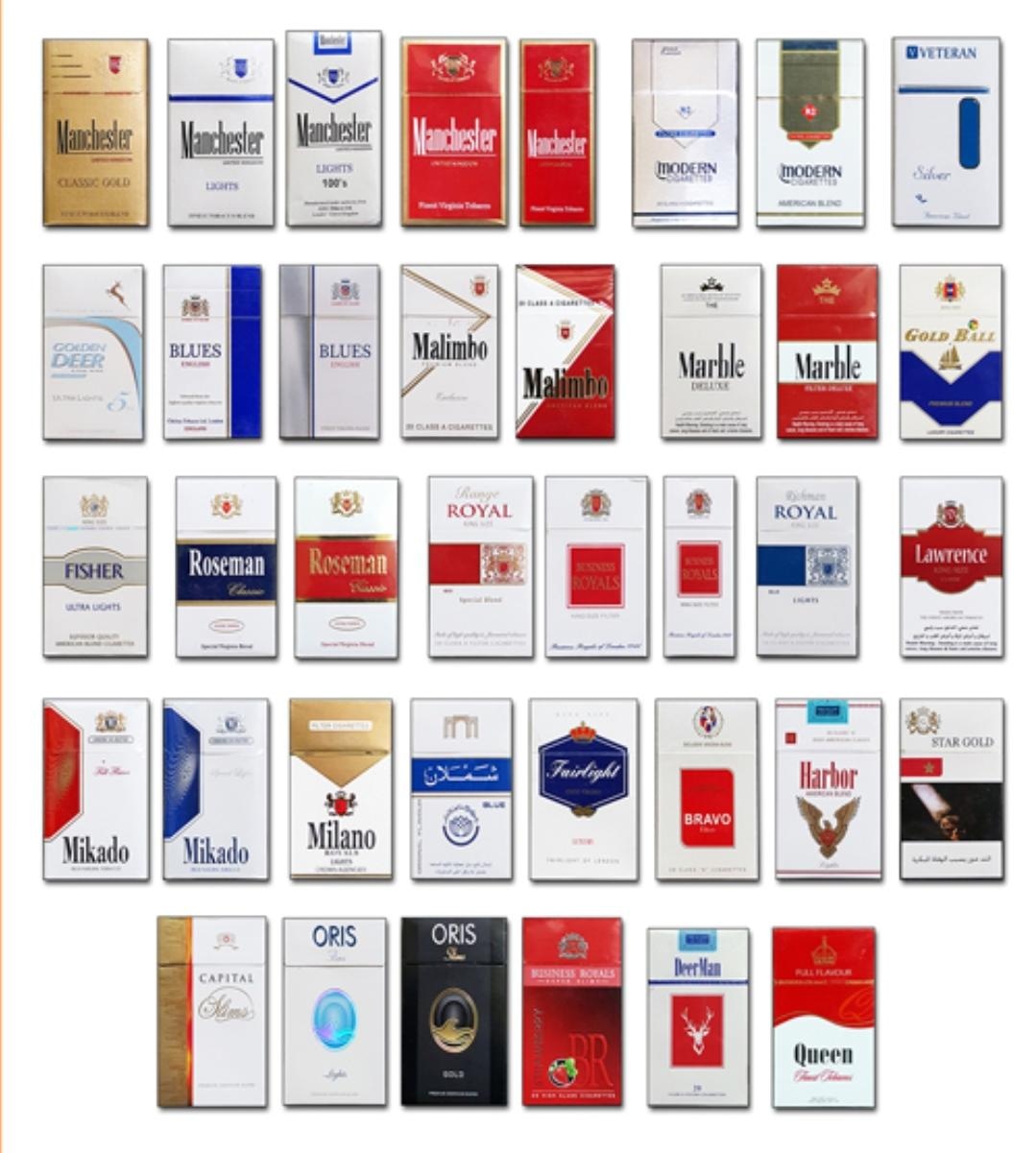
[Multiple types of cigarettes invade the Yemeni market]
What the Investigation Revealed
The flow of smuggled cigarettes into Yemen continues unchecked, in the absence of government control agencies, due to the war, the fragmentation of the state, and the multiplicity of ruling authorities. This investigation shed light on the transformation of the ongoing war in Yemen into a source of profit, and the emerge of groups that finance their activities from this type of black trade, while the country is experiencing the worst humanitarian crisis, and a deep state of fragmentation and rupture that is reinforced by violent groups.
The methods of smuggling, and those involved in it, according to what was stated in this investigation, confirms the extent to which the interests of the war parties in Yemen converge, while they are moving away day after day from peace. They rather meet at the table of suspicious interests. They all agree to maintain this situation that serves its agenda and finances its activities and war.
In general, the country is the biggest loser from these complex operations to smuggle cigarettes, and the state is the completely absent link. As for the victim, it is the people who suffer the material losses caused at one time, and the catastrophic health repercussions at another.
لقراءة المادة باللغة العربية اضغط على الرابط هنا